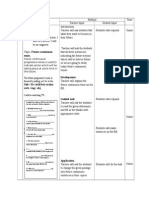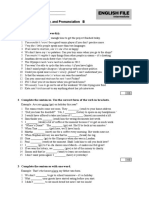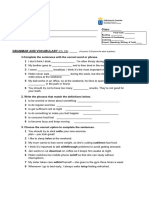Vision L3 U2 Progress Test C
Vision L3 U2 Progress Test C
Uploaded by
marcincwikla61Copyright:
Available Formats
Vision L3 U2 Progress Test C
Vision L3 U2 Progress Test C
Uploaded by
marcincwikla61Copyright
Available Formats
Share this document
Did you find this document useful?
Is this content inappropriate?
Copyright:
Available Formats
Vision L3 U2 Progress Test C
Vision L3 U2 Progress Test C
Uploaded by
marcincwikla61Copyright:
Available Formats
Name:
Unit 2 Progress test C
Grammar
1 Complete the sentences with the verbs below. Use the correct form of used to.
not be live study teach walk not win
1 I __________________ everywhere until my parents bought me a bike.
2 Our team __________________ any matches. We were useless!
3 My mum __________________ in Spain before she met my dad.
4 What ____________________ (your dad) when he worked at the university?
5 There __________________ any street lights in our village. It was always very dark.
6 ____________________ (your sister) hard at school?
Mark: ___ / 6
2 Complete the sentences. Use the correct form of be used to or get used to and the verb in brackets.
1 Do you think gran will ever _______________________ (shop) online?
2 I’m not _______________________ (have) breakfast so late in the morning.
3 We’re _______________________ (wear) a school uniform. It’s weird not having one.
4 My brother is slowly _______________________ (work) in the bank. He only started last month.
5 We’re not _______________________ (walk) to school in the rain. It was always sunny in California.
6 My parents live in the UK now and they’re slowly _______________________ (drive) on the left
Mark: ___ / 6
3 Complete the dialogue. Use the present perfect simple or present perfect continuous form of the verbs
in brackets.
Lise: Where 1__________________ (you / be) all morning? I 2__________________ (look) for you for ages.
3 4
Mark: I __________________ (study) in the library since 10 o’clock. I __________________ (not / finish) my
History essay yet.
Lise: Really? The teacher gave us that homework on Friday. What 5__________________ (you / do) all week?
6
Mark: I __________________ (help) Clare with her Science project. She found it really difficult, but at least she
7
__________________ (do) it now and given it in.
Lise: That’s kind of you. I know she finds Science hard. I 8__________________ (tell) her to ask the teacher for
help since the beginning of term!
Mark: ___ / 8
Vision 3 Tests 1 Unit 2 Progress test C
Vocabulary
4 Complete each pair of sentences with the same word.
1 You need to break the tasks _____________. They’ll be easier to manage then.
Write _____________ everything you have to do in a matrix.
2 We’re going to _____________ Ben as we don’t know where the house is.
Please listen to the police officer and _____________ her instructions.
3 I want to _____________ a gap year and see the world before I go to university.
Don’t expect everyone to tell you what to do – you need to _____________ the initiative sometimes.
4 She’s actually very good, but doesn’t have any confidence _____________ herself.
My teacher said we had to hand _____________ our assignments on Monday.
5 It’s not easy to deal _____________ all my school projects efficiently.
Can anybody help you _____________ your work?
Mark: ___ / 5
5 Complete the sentences with the correct form of the word in CAPITALS.
1 My parents didn’t go to university so didn’t _____________ how much work I had to do. APPRECIATION
2 Many people think that yoga can help their _____________. CONCENTRATE
3 I didn’t _____________ to do so well in my exams. I was delighted! EXPECTATION
4 Jade lost the tickets to the concert and had to _____________ to everyone! APOLOGY
5 A job in _____________ could be very stressful, but very interesting. MANAGE
Mark: ___ / 5
6 Choose the correct word to complete the sentences.
1 Every child in the world has a right / fund to education.
2 There is a curriculum / course at school to study Politics.
3 The workplace can be very productive / competitive and it’s hard to find a good job.
4 Marie’s not great working under pressure / commitments. I’m worried she’ll fail her exams.
5 The managers are convinced / frustrated that the company will do well this year.
6 Without a degree it may be a struggle / pressure to find work these days.
7 Do you think you can study urgently / effectively while listening to music?
8 We need a signature / candidate on this document please.
9 The college funds / fees aren’t very high. Most people can afford to go.
10 I think it’s a productive / reasonable request. He’ll be paid for working an extra hour.
Mark: ___ / 10
Vision 3 Tests 2 Unit 2 Progress test C
Use of English
7 Complete the mini-dialogues with the correct option, A, B or C.
1 Teacher: Katy, have you done anything about your work experience yet?
Katy: No sir. I don’t know what I want to do.
Teacher: Well, _______ talk to Mrs Smith. She might have some ideas for you
A perhaps you should B have you thought about C I’d like you to try
2 Alex: Hi Conrad. Did you get the tickets OK?
Conrad: No, _______ – I got there too late and there weren’t any left.
Alex: Oh, no. I really wanted to see that game.
A I realise I should have B In other words C I’m really sorry
3 Teacher: Emily, your project was due in yesterday, what’s the reason this time?
Emily: Er, it was on my laptop which my brother broke!
Teacher: _______, you haven’t done it.
A What you mean is B Perhaps you should C What I was trying to say is
4 Ana: We’ve got so much homework. I don’t think I can cope!
Peter: What do you mean?
Ana: Well, _______ that I’ve always found it hard to work under pressure!
A I’d suggest B what I say is C what I was trying to say is
5 Andy: It’s a what? _______?
Teacher: Sure. It’s an intrapreneurship.
Andy: And what’s that? Is it like an internship?
A What I meant was do B I’m sorry, can you say that again C That’s an interesting question
Mark: ___ / 5
8 Choose the translation of the word or phrase in brackets that completes the sentence correctly.
1 My sister’s just got an (staż) ______________ in an engineering company. There’s no pay, but it’s a great experience.
A qualification B internship C apprenticeship
2 As Oscar (dobrze sobie poradził) ______________ in his exams, his parents are paying towards his driving lessons!
A failed B finished C did well
3 We’re all (wielkimi fanami sportu) ______________ in our family, especially basketball which we watch on TV.
A big sports fans B basketball fans C big fans
4 It was great to see everyone today and we’ll (będziemy w kontakcie) ______________ to let you know the results.
A be in touch B have a say C expected
5 I can always (liczyć na) ______________ my best friend to help me when I can’t cope with my homework.
A focus on B count on C tell on
Mark: ___ / 5
Vision 3 Tests 3 Unit 2 Progress test C
Reading
9 Read the text. Choose the correct answer, A, B, C or D.
The idea of ‘lifelong learning’ has become more and more popular since the phrase was first
used, in 1993. Basically, the idea is that learning isn’t limited to classrooms or to childhood. It
is a process that can happen in a range of different situations every day, when we interact
with the people and world around us. It is completely voluntary, and the motivation can be
personal or professional.
‘Lifelong learning’ is for anyone. It can include anything from going to a language class to
learn some phrases to use on holiday to studying for a formal professional qualification for a
change of career. The number of over-75s in the UK is estimated to have increased by 28% in
the last decade, and studying is a great way to keep your brain active.
There are many interesting stories about older learners. An 81-year-old student at a language
th
school in Switzerland has been studying English for many years. For her 80 birthday, she
decided to go on a study trip to Hawaii. And in Germany, in 2008, Professor Dr Heinz
Wenderoth became the oldest person to be awarded a Doctor of Science degree. He was 97
years old!
At the other end of the education system, Kimani Karuge became the oldest person ever to go
to school when he started at a primary school in Eldoret, in Kenya, in 2004. The government
had introduced free education the year before, and he wanted to learn to read. At the time, he
was 84 and he had 30 grandchildren – two of them were already at the same school!
Studying later in life doesn’t just benefit the students who do it. One university teacher says
that older students are often more enthusiastic than younger ones, particularly if they have
missed out on part of their education earlier in life. They have often had to cope with many
challenges, and they appreciate having a ‘second chance’. Younger students are fascinated
by their life experience – and the older students are often an inspiration to the younger
students.
1 ‘Lifelong learning’
A is limited to certain people and places.
B is an experience anyone can have.
C started about 20 years ago.
D usually happens during the day.
2 Which is TRUE about older learners in the UK?
A there are more of them than in the past
B they make up 28% of the population
C many are studying for professional qualifications
D a lot of them are going on holiday
3 Dr Heinz Wenderoth
A began studying English when he was over 80 years old.
B went abroad for the first time recently.
C studied in a Swiss school.
D received a Doctor of Science degree.
Vision 3 Tests 4 Unit 2 Progress test C
4 Younger students
A are often inspired by much older students.
B have greater challenges than the older students.
C are very enthusiastic.
D don’t benefit from having older learners in the class.
5 Which is the best title for the text?
A LEARN WHEN YOU’RE YOUNGER IF YOU CAN
B YOUNGER STUDENTS ARE BETTER LEARNERS
C YOU’RE NEVER TOO OLD TO LEARN
D LIFELONG LEARNING ISN’T FOR EVERYONE
Mark: ___ / 5
Listening
10 You will hear a conversation about someone who faced challenges in education.
Are the sentences true (T) or false (F)?
1 At the beginning, Ana and Rob both believe they are lucky. ___
2 Helen Keller was very ill and lost her hearing and sight. ___
3 Helen’s parents taught her to read and write. ___
4 Helen liked being with animals. ___
5 Helen received a university education. ___
Mark: ___ / 5
Writing
11 Read the task and write an email (80–130 words).
You are a student at university. You want to get some work experience to help you find a job in the TV
industry. Your uncle works in the TV industry. Write an email to him to ask for help.
Tell him about what you’re studying and the area you would like to work in.
Mention why it would be useful for you to get some work experience.
Explain how you could manage work experience alongside your studies.
Politely ask if you could spend some time in your uncle’s workplace.
Mark: ___ / 10
Total: ___ / 70
Vision 3 Tests 5 Unit 2 Progress test C
You might also like
- Unit 3 Test Standard ADocument3 pagesUnit 3 Test Standard AKatarzyna Przybycień100% (2)
- 2023 BOOKLET 5th FORM - ENGLISHDocument246 pages2023 BOOKLET 5th FORM - ENGLISHJana Sueños Larr100% (1)
- Unit 1 Progress Test A: GrammarDocument4 pagesUnit 1 Progress Test A: Grammardaswood2010% (1)
- Cumulative Test 6-9 B: GrammarDocument5 pagesCumulative Test 6-9 B: GrammarDAVID50% (2)
- Future Continous Lesson PlanDocument5 pagesFuture Continous Lesson Planapi-278904207100% (1)
- Unit 1 Progress Test B: GrammarDocument5 pagesUnit 1 Progress Test B: Grammardaswood201100% (3)
- TOEFL Vocabulary List 7Document1 pageTOEFL Vocabulary List 7Dasha SayedNo ratings yet
- Unit 9 StudentDocument23 pagesUnit 9 StudentQuoc Tan Huynh100% (1)
- Unit 9 StudentDocument23 pagesUnit 9 StudentNguyễn LinhNo ratings yet
- Mindset For IELTS Level 1 Skills ModulesDocument187 pagesMindset For IELTS Level 1 Skills Modulesthangcao160499No ratings yet
- End-Of-Term Test Higher BDocument6 pagesEnd-Of-Term Test Higher Barek.przyslawski7756No ratings yet
- Unit 6 Standard Test B: ListeningDocument2 pagesUnit 6 Standard Test B: ListeningЕлена ХоменкоNo ratings yet
- Unit 6 Standard Test ADocument2 pagesUnit 6 Standard Test ABelen Garcia100% (1)
- Examen Christian Coaquira PRE INTERMEDIODocument8 pagesExamen Christian Coaquira PRE INTERMEDIOXristian Coaquira RodriguezNo ratings yet
- End-Of-Term Test Higher ADocument6 pagesEnd-Of-Term Test Higher Aarek.przyslawski7756No ratings yet
- Unit 6 Standard Test B: ListeningDocument2 pagesUnit 6 Standard Test B: ListeningBelen GarciaNo ratings yet
- DY3 - G&V - Unit 1 - CHALLENGEDocument2 pagesDY3 - G&V - Unit 1 - CHALLENGEAna belen Raya lendinezNo ratings yet
- DY3 - GV - Unit 1 - CHALLENGEDocument2 pagesDY3 - GV - Unit 1 - CHALLENGEÈrika Salmerón GarcíaNo ratings yet
- Unit 4 Standard Test BDocument2 pagesUnit 4 Standard Test BCarla MartinoNo ratings yet
- Progress Test Unit1Document9 pagesProgress Test Unit1Marjona XabibullayevaNo ratings yet
- End-Of-Course Test Grammar, Vocabulary, and Pronunciation BDocument8 pagesEnd-Of-Course Test Grammar, Vocabulary, and Pronunciation BEu GeniaNo ratings yet
- End-Of-Course Test Grammar, Vocabulary, and Pronunciation BDocument8 pagesEnd-Of-Course Test Grammar, Vocabulary, and Pronunciation BAnalía CimolaiNo ratings yet
- Focus1 2E Review Test 3 Units1 6 Vocabulary Grammar UoE Reading GroupBDocument3 pagesFocus1 2E Review Test 3 Units1 6 Vocabulary Grammar UoE Reading GroupBuanna6686No ratings yet
- B2 Progress Test 2023 (Units1-5)Document7 pagesB2 Progress Test 2023 (Units1-5)cifd imed100% (1)
- Laser B2 Unit 11 Test Name: . Section 1Document5 pagesLaser B2 Unit 11 Test Name: . Section 1Аги МитковаNo ratings yet
- AEF3e L2 Filetest 6aDocument8 pagesAEF3e L2 Filetest 6abrunoleonardofsantosNo ratings yet
- Cumulative Test 1-5 B: GrammarDocument4 pagesCumulative Test 1-5 B: GrammarRanda KHOURI MOUKADDEM33% (3)
- Form 4 Unit 4Document15 pagesForm 4 Unit 4Emim AriffahNo ratings yet
- Cumulative Test 1-5 B: GrammarDocument4 pagesCumulative Test 1-5 B: GrammarRanda KHOURI MOUKADDEM100% (1)
- Focus4 2E Test Unit1 GroupA 1kolDocument7 pagesFocus4 2E Test Unit1 GroupA 1kolyyph75mt5cNo ratings yet
- Focus 2 Unit 1 ADocument4 pagesFocus 2 Unit 1 AxstarkpowerNo ratings yet
- Sol2e ELEM Progress Test 3A PDFDocument5 pagesSol2e ELEM Progress Test 3A PDFTóth MiklósNo ratings yet
- Sol2e ELEM - Progress Test - 3ADocument5 pagesSol2e ELEM - Progress Test - 3AerdalNo ratings yet
- Sol2e ELEM Progress Test 3ADocument5 pagesSol2e ELEM Progress Test 3AKateNo ratings yet
- Unit 4 Standard Test ADocument2 pagesUnit 4 Standard Test ACarla MartinoNo ratings yet
- Q1-Summative Test-English-9-2022Document3 pagesQ1-Summative Test-English-9-2022Sweetzell IsaguirreNo ratings yet
- Unit 6 Standard Test ADocument2 pagesUnit 6 Standard Test Atsveta sarafskaNo ratings yet
- Test Unit 3 IntermediateDocument5 pagesTest Unit 3 IntermediateAniaNo ratings yet
- End of Term 1 Standard Test BDocument2 pagesEnd of Term 1 Standard Test BTHILAGESWARI A/P KANAGASINGAM MoeNo ratings yet
- Unit 9: Exercise 1: Match The Sentence HalvesDocument5 pagesUnit 9: Exercise 1: Match The Sentence HalvesBảo An HoàngNo ratings yet
- HighNote1 U1-2 Cumulative Test BDocument2 pagesHighNote1 U1-2 Cumulative Test BMagda Lewandowska-Derela100% (1)
- EC - A1P - Language Test 6ADocument4 pagesEC - A1P - Language Test 6AAgnieszka KarpiarzNo ratings yet
- End-Of-Term Test 1: ListeningDocument4 pagesEnd-Of-Term Test 1: ListeningPerico Delospalited100% (1)
- Examen Unit3Document3 pagesExamen Unit3Pedro QuevedoNo ratings yet
- End-Of-Course Test Grammar, Vocabulary, and Pronunciation ADocument8 pagesEnd-Of-Course Test Grammar, Vocabulary, and Pronunciation ACamila Andrea Olivero ArayaNo ratings yet
- Focus2 2E Review Test 1 Units1 2 Vocabulary Grammar UoE ReadingDocument3 pagesFocus2 2E Review Test 1 Units1 2 Vocabulary Grammar UoE ReadingtolikmalibrodaNo ratings yet
- EC - B1P - Language Test 1BDocument4 pagesEC - B1P - Language Test 1Bad.skierkowskaNo ratings yet
- Sol2e Int Progress Test 03ADocument6 pagesSol2e Int Progress Test 03ANatasha MarinaNo ratings yet
- Unit 3 StudentDocument21 pagesUnit 3 StudentPhuongNo ratings yet
- WIDGB1 Utest Language 4ADocument2 pagesWIDGB1 Utest Language 4ASashkaKoreckaja0% (2)
- 7256 20221221 Exercici 4ESO Christmas HomeworkDocument10 pages7256 20221221 Exercici 4ESO Christmas HomeworktitiNo ratings yet
- Unit 3 Test Higher ADocument3 pagesUnit 3 Test Higher Akukulamalgorzata78No ratings yet
- Sol2e Int Progress Test 03ADocument6 pagesSol2e Int Progress Test 03AMinecraft gamingNo ratings yet
- Acfrogcp 5b1ie0q7f5emctz2kwvybpusz1y1ot6pccoj14xmxklokgarvo3yyds Zvl1turz22b0cwwffmkroe0hdhpw7zvxfsslmm Rtyaasvgxq Ra Mylmujvcot1muu5uy9zwxinwu6ibgDocument4 pagesAcfrogcp 5b1ie0q7f5emctz2kwvybpusz1y1ot6pccoj14xmxklokgarvo3yyds Zvl1turz22b0cwwffmkroe0hdhpw7zvxfsslmm Rtyaasvgxq Ra Mylmujvcot1muu5uy9zwxinwu6ibgmarikakornasinska21No ratings yet
- End-Of-Term Test Standard ADocument6 pagesEnd-Of-Term Test Standard AŁukasz WnukNo ratings yet
- 2-in-1 Book Series: Teacher King’s English Beginner Course Book 1 & English Speaking Course Book 1 - Chinese EditionFrom Everand2-in-1 Book Series: Teacher King’s English Beginner Course Book 1 & English Speaking Course Book 1 - Chinese EditionNo ratings yet
- 2-in-1 Book Series: Teacher King’s English Beginner Course Book 1 & English Speaking Course Book 1 - Thai EditionFrom Everand2-in-1 Book Series: Teacher King’s English Beginner Course Book 1 & English Speaking Course Book 1 - Thai EditionNo ratings yet
- Practicing with Prepositions in Everyday English Beginner LevelFrom EverandPracticing with Prepositions in Everyday English Beginner LevelRating: 3 out of 5 stars3/5 (3)
- 2-in-1 Book Series: Teacher King’s English Beginner Course Book 1 & English Speaking Course Book 1 - Croatian EditionFrom Everand2-in-1 Book Series: Teacher King’s English Beginner Course Book 1 & English Speaking Course Book 1 - Croatian EditionNo ratings yet
- 2-in-1 Book Series: Teacher King’s English Beginner Course Book 1 & English Speaking Course Book 1 - Russian EditionFrom Everand2-in-1 Book Series: Teacher King’s English Beginner Course Book 1 & English Speaking Course Book 1 - Russian EditionNo ratings yet
- IHRM's Topic Sustainable Expatriate ManagementDocument12 pagesIHRM's Topic Sustainable Expatriate ManagementLee JordanNo ratings yet
- She Has A Serious Illness.: Suffix - NessDocument3 pagesShe Has A Serious Illness.: Suffix - NessJosé Ignacio Ortiz HidalgoNo ratings yet
- De Thi Tieng Anh 11Document6 pagesDe Thi Tieng Anh 11Thủy LêNo ratings yet
- Storybird Lesson PlanDocument4 pagesStorybird Lesson PlanTonyaNo ratings yet
- Kannada Lessons For The BeginnerDocument106 pagesKannada Lessons For The Beginnerdhaya100% (1)
- Ah4 - Unit 1Document156 pagesAh4 - Unit 1thy nguyen100% (1)
- Final Hard Copy EAPPDocument15 pagesFinal Hard Copy EAPPjohanna patayecNo ratings yet
- Grad Transitions: by Austyn FrostadDocument18 pagesGrad Transitions: by Austyn FrostadconvertpowepointNo ratings yet
- Bol in English Grade 8Document5 pagesBol in English Grade 8Nimfa Rapsag SeparaNo ratings yet
- Soal Pat Xii Bahasa Inggris Tahun 2024Document13 pagesSoal Pat Xii Bahasa Inggris Tahun 2024Ana SofiantiNo ratings yet
- Natural Order HypothesisDocument15 pagesNatural Order HypothesisTara KingNo ratings yet
- Liberation Period Group 5Document4 pagesLiberation Period Group 5charinajoy.linganNo ratings yet
- 1st Year Booklet - 2024 CPSRDocument82 pages1st Year Booklet - 2024 CPSRpriscila MartinettiNo ratings yet
- Daraga Communit-Wps OfficeDocument28 pagesDaraga Communit-Wps Officesalibiomarygrace6No ratings yet
- No ErrorDocument23 pagesNo ErrorAkarshit100% (1)
- Learn Rust FasterDocument7 pagesLearn Rust Faster0xibrahim0.5No ratings yet
- Allegro Tutorials: / Comments Will Be in A Characteristic Blue-GreenDocument45 pagesAllegro Tutorials: / Comments Will Be in A Characteristic Blue-GreenKhan ShaadNo ratings yet
- Order of AdjectivesDocument12 pagesOrder of AdjectivesT. JHONNo ratings yet
- SEPA MK 12 Ib en 02Document28 pagesSEPA MK 12 Ib en 02Zvonko DamnjanovicNo ratings yet
- Columna de Verbos IRREGULARESDocument3 pagesColumna de Verbos IRREGULARESElian MorantNo ratings yet
- Carol Ann Duffy - OMPLISTT Guided Annotation - Education For Leisure - , - Head of EnglishDocument2 pagesCarol Ann Duffy - OMPLISTT Guided Annotation - Education For Leisure - , - Head of EnglishTanishq Bindra100% (2)
- First 1Document18 pagesFirst 1anggreinimole02No ratings yet
- Discursive Strategies in Online MediaDocument12 pagesDiscursive Strategies in Online MediadjordjevicjasminaNo ratings yet
- Teacher: Areeya Mae C. Factores Filipino 6Document20 pagesTeacher: Areeya Mae C. Factores Filipino 6areeya mae factoresNo ratings yet
- Quiz INGLÈS A2Document11 pagesQuiz INGLÈS A2Viviana Andrea Rodriguez RojasNo ratings yet
- LP Possessive PronounsDocument8 pagesLP Possessive PronounsMarleneAgustin100% (4)
- How Much Salary Do You Expect - HR Interview Questions and AnswersDocument9 pagesHow Much Salary Do You Expect - HR Interview Questions and AnswersMohammad AsifNo ratings yet
- Deconstruction: Binary, Oppositional Thinking. This Is To Say, Each Term in The WesternDocument3 pagesDeconstruction: Binary, Oppositional Thinking. This Is To Say, Each Term in The WesternTalim EnamNo ratings yet

























































































